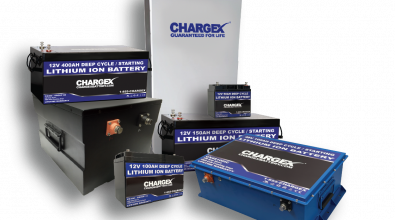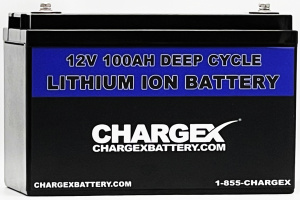Blog Post 03/21/2024

Lithium Vs Lead, AGM and Gel Batteries
If you're searching the worldwide market for the best Lithium Batteries in the industry, we're glad you are here. Here are some of these reasons you might want to consider when upgrading to Lithium Batteries for your application.
The downsides of Lead Acid Batteries
To understand why lithium batteries show such promise for replacement of lead batteries, it first helps to understand all the ways that traditional lead acid batteries fall short.
Limited Usable Capacity
It is typically considered wise to use just 30% – 50% of the rated capacity of typical lead acid batteries. This means that a 400 amp hour battery bank in practice only provides, at best, 200 amp hours of actual usable capacity. If you even occasionally drain the batteries more than this their life will be drastically cut short.
Limited Cycle Life
Lead acid batteries require special attention to avoid reducing their life by draining them too low or not fully charging them. Even if you are going easy on your batteries and are careful to never overly drain them, the best deep cycle lead acid batteries are typically only good for 300 cycles. This could mean that your batteries may need replacement in less than 2 years!
Slow & Inefficient Charging
Lead Acid batteries require multi stage chargers with complex algorithms to keep them from over heating or swelling. Not fully charging a lead battery leads to premature aging further reducing cycle life.
Placement Issues
Flooded lead acid batteries release toxic acidic gas while they are charging, and must be vented. They also must be stored upright, to avoid battery acid spills.
Peukert's losses & Voltage Sag
A fully charged lead acid battery starts off around 12.8 volts, as it is drained the voltage drops steadily. When the voltage drops below 12 volts the battery has about 25% of its usable capacity remaining, Some RV inverters and electronics may fail to operate with less than a full 12 volt supply.Also – the faster that you discharge a lead acid battery of any type, the less energy you can get out of it. This effect can be calculated by applying Peukert’s Law, and in practice this means that high current loads like an air conditioner, a microwave or an induction cooktop can result in a lead acid battery bank only producing less than 60% of its normal capacity. This is a huge loss in capacity when you need it most!
Size & Weight
Lead Acid Batteries are Big & very Heavy!!! A typical 8D sized battery that is commonly used for large RV’'s like the Trojan 8D-AGM weighs 167lbs, and provides just 230 amp-hours of total capacity – which leaves you with 115 amp hours truly usable, and only 70 for a high discharge applications.Technological Advantages of Lithium Batteries
A confluence of events is setting the stage for what may well be dramatic change in the battery industry that has not changed much in the past 40 years. Lithium Batteries are arriving at a good time, manufacturers are facing some difficult challenges with respect battery life in applications ranging from Marine and RV, to Aerospace and Defense. These challenges are driving the need for Lithium Batteries in that offer more flexibility when it comes to:
- Reduced Footprint & Weight allowing a more effective use of space
- Increased Battery Capacity
- Ability to Predict Failures
- Extended Life
- Eliminate Maintenance and Overhead
Lithium batteries provide multiple times the energy density as compared to Lead Acid Batteries. As a result Lithium batteries take up much less space than lead batteries that deliver the same power. Lithium Batteries can also withstand a wider temperature range than lead batteries and are less sensitive to temperature fluctuations. Predicting end of life for lead batteries can be almost impossible and they can fail without warning. Lithium Batteries last for thousands of cycles so most applications may never know what it's like to see a lithium battery die. For those who may cycle batteries everyday It could be over 10 years before Lithium batteries would show signs of reduced capacity.
Lower Total Cost
Although the initial investment in lithium batteries tends to be higher compared to lead-acid alternatives, they offer significant cost advantages in the long run. Lead-acid batteries degrade more rapidly, necessitating frequent replacements over a short period. In contrast, lithium-ion batteries can endure the intense cycling required in bridge-to-backup scenarios without issue, leading to a lifespan several times longer than that of lead-acid options in most scenarios. The enduring reliability of lithium batteries makes them a robust choice for energy storage in bridge-to-backup setups. Consequently, this diminishes the total cost of ownership associated with procuring the solution. Thus, despite the slightly higher upfront expenditure, opting for lithium batteries results in substantial savings over time.
Wasted Energy
Lead acid batteries suffer another efficiency issue – they waste as much as 25% of the energy put into them via inherent charging inefficiency. So if you provide 100 amps of power, you’ve only storing 75 amp hours. This can be especially frustrating when charging via solar, when you are trying to squeeze as much efficiency out of every amp as possible before the sun goes down or gets covered up by clouds.
Deep Discharge without consequences
The ability to rapidly discharge energy is great, but lead-acid battery life may be compromised when used this way. Available lead-acid battery capacity decreases as their discharge rate increases, and product life rapidly degrades when they are deeply discharged (i.e. more than 30-50%). This means the nameplate capacity of the batteries must be 2-3x greater than the level of desired performance. Lithium ion batteries are designed specifically to withstand deep depth of discharge (DOD) making them capable of lasting much longer over time without having to be replaced.
No Doubt, Lithium Ion Batteries are more expensive than Lead Acid Batteries, But upgrading to them assures better performance of your motor home.
- Thor Motor Coach
Read their blog here - Thor Motor Coach Blog
Want to get more information about Chargex Lithium Batteries?
Request our Lithium Vs Lead E-Book
Want to discuss Lithium Battery options for your application?
CALL NOW 1-855-242-7439 OR SEND US A MESSAGE BELOW
We are here Monday through Friday from 8am to 5pm EST and respond to most messages the same business day.


